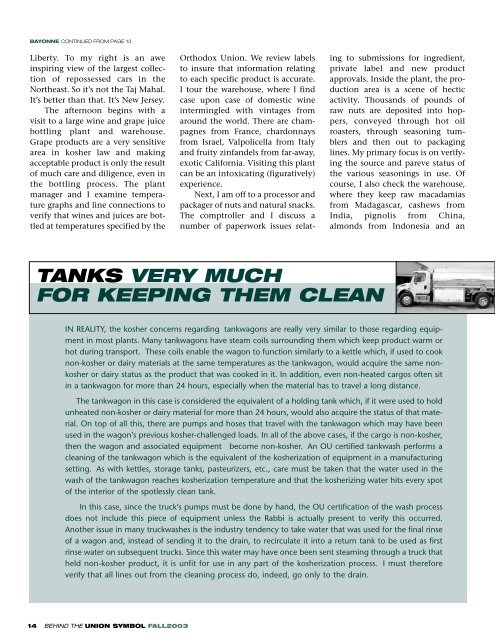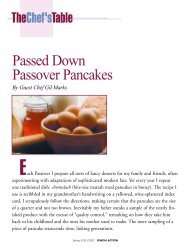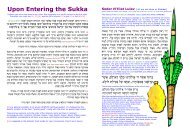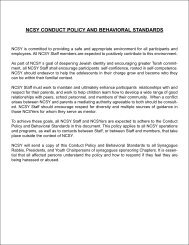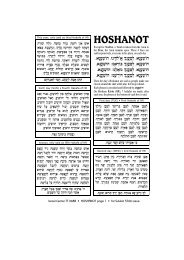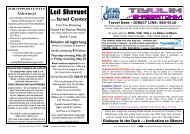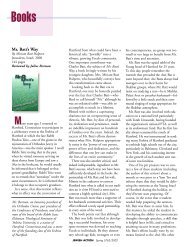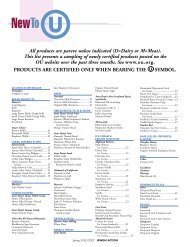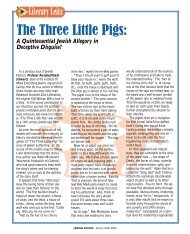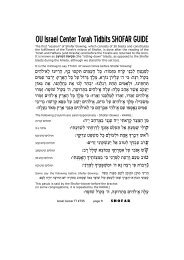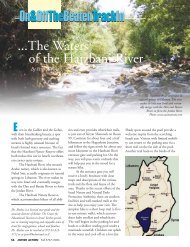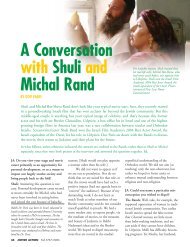EATING THEIR WHEATIES: - OU Kosher
EATING THEIR WHEATIES: - OU Kosher
EATING THEIR WHEATIES: - OU Kosher
You also want an ePaper? Increase the reach of your titles
YUMPU automatically turns print PDFs into web optimized ePapers that Google loves.
BAYONNE CONTINUED FROM PAGE 13<br />
Liberty. To my right is an awe<br />
inspiring view of the largest collection<br />
of repossessed cars in the<br />
Northeast. So it’s not the Taj Mahal.<br />
It’s better than that. It’s New Jersey.<br />
The afternoon begins with a<br />
visit to a large wine and grape juice<br />
bottling plant and warehouse.<br />
Grape products are a very sensitive<br />
area in kosher law and making<br />
acceptable product is only the result<br />
of much care and diligence, even in<br />
the bottling process. The plant<br />
manager and I examine temperature<br />
graphs and line connections to<br />
verify that wines and juices are bottled<br />
at temperatures specified by the<br />
Orthodox Union. We review labels<br />
to insure that information relating<br />
to each specific product is accurate.<br />
I tour the warehouse, where I find<br />
case upon case of domestic wine<br />
intermingled with vintages from<br />
around the world. There are champagnes<br />
from France, chardonnays<br />
from Israel, Valpolicella from Italy<br />
and fruity zinfandels from far-away,<br />
exotic California. Visiting this plant<br />
can be an intoxicating (figuratively)<br />
experience.<br />
Next, I am off to a processor and<br />
packager of nuts and natural snacks.<br />
The comptroller and I discuss a<br />
number of paperwork issues relating<br />
to submissions for ingredient,<br />
private label and new product<br />
approvals. Inside the plant, the production<br />
area is a scene of hectic<br />
activity. Thousands of pounds of<br />
raw nuts are deposited into hoppers,<br />
conveyed through hot oil<br />
roasters, through seasoning tumblers<br />
and then out to packaging<br />
lines. My primary focus is on verifying<br />
the source and pareve status of<br />
the various seasonings in use. Of<br />
course, I also check the warehouse,<br />
where they keep raw macadamias<br />
from Madagascar, cashews from<br />
India, pignolis from China,<br />
almonds from Indonesia and an<br />
TANKS VERY MUCH<br />
FOR KEEPING THEM CLEAN<br />
IN REALITY, the kosher concerns regarding tankwagons are really very similar to those regarding equipment<br />
in most plants. Many tankwagons have steam coils surrounding them which keep product warm or<br />
hot during transport. These coils enable the wagon to function similarly to a kettle which, if used to cook<br />
non-kosher or dairy materials at the same temperatures as the tankwagon, would acquire the same non-<br />
❝<br />
I marvel kosher or dairy at the status array as the product of wildlife that was inhabiting cooked it. In addition, the roadways even non-heated of New cargos often Jersey. sit It<br />
in a tankwagon for more than 24 hours, especially when the material has to travel a long distance.<br />
is a virtual wild kingdom, with roaring lions and speedy cheetahs weaving in<br />
The tankwagon<br />
and out of traffic.<br />
❞<br />
in this case is considered the equivalent of a holding tank which, if it were used to hold<br />
unheated non-kosher or dairy material for more than 24 hours, would also acquire the status of that material.<br />
On top of all this, there are pumps and hoses that travel with the tankwagon which may have been<br />
used in the wagon’s previous kosher-challenged loads. In all of the above cases, if the cargo is non-kosher,<br />
then the wagon and associated equipment become non-kosher. An <strong>OU</strong> certified tankwash performs a<br />
cleaning of the tankwagon which is the equivalent of the kosherization of equipment in a manufacturing<br />
setting. As with kettles, storage tanks, pasteurizers, etc., care must be taken that the water used in the<br />
wash of the tankwagon reaches kosherization temperature and that the kosherizing water hits every spot<br />
of the interior of the spotlessly clean tank.<br />
In this case, since the truck’s pumps must be done by hand, the <strong>OU</strong> certification of the wash process<br />
does not include this piece of equipment unless the Rabbi is actually present to verify this occurred.<br />
Another issue in many truckwashes is the industry tendency to take water that was used for the final rinse<br />
of a wagon and, instead of sending it to the drain, to recirculate it into a return tank to be used as first<br />
rinse water on subsequent trucks. Since this water may have once been sent steaming through a truck that<br />
held non-kosher product, it is unfit for use in any part of the kosherization process. I must therefore<br />
verify that all lines out from the cleaning process do, indeed, go only to the drain.<br />
14 BEHIND THE UNION SYMBOL FALL2003


